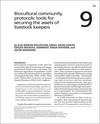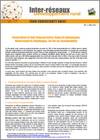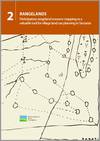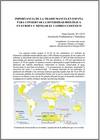The role of communities in animal genetic resource conservation still remains largely invisible to scientists and bureaucrats. Livestock keepers in Pakistan, India and Kenya have developed community protocols to improve the visibility of the role of livestock keepers in conserving genetic resources, addressing problems of access to grazing land and conserving threatened breeds, as well as asserting customary rights in order to secure benefits from commercial use. This article examines three different experiences – the Pashtoon, Raika and Samburu BCPs – and the extent to which these were community-driven processes. It looks at whether and how communities have been able to make use of the protocols in the struggle to have their rights recognised. It concludes that BCPs are extremely useful for making visible the connection between communities and their breeds and important for securing the assets of livestock keepers in the long term.
Year of publication: 2012Organization: Индивидуальные авторы, Международный институт по окружающей среде и развитию
Topic: Экологические услуги, Коренные знания
Language: English
Type of document: Технический
Geographical coverage: Восточная Африка, Южная Азия
This six page brief discusses the economic advantages and challenges of pastoralism in sub-Saharan Africa. It highlights that urgent action is needed to promote the land rights and social services for pastoral communities and strengthen the capacities and involvement of pastoralist organizations.
Year of publication: 2012Organization:
Topic: Экономика, Земля, Участие
Language: English, Français
Type of document: Технический
Geographical coverage: Западная Африка, Центральная Африка, Восточная Африка, Южная Африка
Mobile indigenous peoples have sustainably managed the land they live on for centuries. However, in the name of biodiversity conservation, some have been displaced and removed from their traditional territories and left destitute and culturally weakened. While these practices have been largely unwanted in theory by biodiversity conservation agencies, progress in human rights observance and land compensation lagged behind new thinking on the relationship between people and protected areas. Thus, local and national policy and institutional change in the field have not kept pace with advances in thinking at the international level; nor do they always live up to public declarations of concern for human rights. Ten years after the Dana Declaration on Mobile Peoples and Conservation was formulated in Wadi Dana, Jordan, it is time to follow up on the achievements of the past decade and consider the future. This workshop report therefore, addresses the concerns regarding the welfare of mobile indigenous peoples in biodiversity conservation.
Year of publication: 2012Organization: Индивидуальные авторы
Topic: Экологические услуги, Коренные народы
Language: English
Type of document: Технический, Политика и законодательство
Geographical coverage: Глобальный
Pastoralists and other indigenous livestock keepers have created breeds that are a crucial asset to humanity in adapting to climate change, conserving biological diversity and sustaining food production in harsh and challenging environments. Biocultural protocols are a means of bringing to light the crucial role of communities in conserving indigenous breeds and in maintaining the web of life that depends on them. The film showcases biocultural Protocols highlighting the Raika community of Rajasthan and the Samburu of Kenya.
Year of publication: 2012Organization: , ,
Topic: Изменение климата, Экологические услуги, Коренные народы
Language: English
Type of document: Видео
Geographical coverage: Глобальный
Participatory mapping of rangelands has proved to be a vital and powerful information-generating tool for identifying and understanding the use of rangeland resources and access to them. This paper presents a mapping exercise that took place in the Ng’abolo village in Kiteto District in Tanzania.
Year of publication: 2012Organization:
Topic: Земля
Language: English
Type of document: Технический
Geographical coverage: Восточная Африка
Las regiones áridas ocupan el 41,3% de los continentes, 6,5 millones de kilómetros cuadrados donde habitan unos 2.000 millones de personas, de los cuales 650 millones se encuentran entre los más pobres de los pobres. El 40% de estos territorios es aprovechado por pastores nómadas, el 25% por rancheros, el 12% por agricultores de secano y el 2% de regadío. El pastoreo extensivo desempeña un papel fundamental en la absorción del carbono atmosférico, reduciendo la erosión, conservando el agua, favoreciendo la actividad icrobiana y la incorporación de nutrientes, mejorando la estructura del suelo y su productividad. El manejo adecuado de los pastizales, la plantación de arbolado y las correctas prácticas agrícolas pueden fijar del 10 al 20% de las emisiones globales de combustibles fósiles, por lo que la conservación del pastoreo extensivo se plantea como una de las grandes alternativas para el desarrollo sostenible y la adaptación al cambio climático durante las próximas décadas.
Year of publication: 2012Organization: Индивидуальные авторы
Topic: Изменение климата, Экологические услуги, Продовольственная безопасность, Инновация, Быстрая восстанавливаемость
Language: Español
Type of document: Технический, Научный, Карты
Geographical coverage: Европа
When considering climate change, marginalized populations and pastoralists, warrant particular attention. Impacts on their territories and communities are anticipated to be both early and severe due to their location in vulnerable environments. Community-based and local knowledge may offer valuable insights into environmental change due to climate change, and complement broader-scale scientific research with local precision and nuance.
This report provides an overview of the published scientific literature (primarily peer-reviewed, but also grey) relating to the contribution of traditional/indigenous knowledge to our understanding of global climate change: observations, impacts, and opportunities for adaptation.
Year of publication: 2012Organization: Индивидуальные авторы
Topic: Изменение климата, Коренные знания, Коренные народы
Language: English
Type of document: Технический
Geographical coverage: Глобальный
Los países industrializados estamos afectando gravísimamente al medio ambiente de nuestro planeta, comprometiendo el futuro de toda la Humanidad. Es urgente reducir de inmediato nuestras emisiones de CO2 para que comiencen a decrecer antes de 2020, limitándolas a cero antes de 2050 respecto a los niveles de 1990. Para ello los países industrializados debemos modificar radicalmente nuestro modelo energético y nuestras pautas de consumo para intentar mitigar la crisis global que estamos provocando. Pero, junto a la reducción inmediata de las emisiones es necesario fomentar también los sumideros de carbono, que permitan retirar de la atmósfera el exceso de CO2 generado durante este último siglo.
Year of publication: 2012Organization:
Topic: Изменение климата, Продовольственная безопасность, Организация
Language: Español
Type of document: Рассылки
Geographical coverage: Европа









